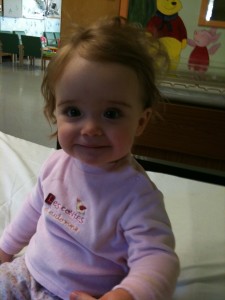Norovirus
 Norovirus, better known as the winter vomiting bug, (or in our house the nasty sick sick bug) is the most common stomach bug in the UK, affecting people of all ages.
Norovirus, better known as the winter vomiting bug, (or in our house the nasty sick sick bug) is the most common stomach bug in the UK, affecting people of all ages.
Norovirus is highly contagious so once one member of the family gets it, it’s likely the rest of the family will too.
Norovirus causes vomiting and diarrhoea which in turn can cause dehyfration. Therefor as with any sickness bug it’s important to keep your littlies well hydrated.
the best way of doing this is to give little sips of eater often. Even if they bring back the fluids, keep topping them up.
Symptoms
vomiting and diarrhoea
Treatment
There is no specific cure for Norovirus – you simply have to let it run its course, but it should not last more than a couple of days. If your littlies get norovirus follow these simple guidelines.
-
Get them to drink plenty of water to avoid dehydration.
-
Give infant paracetamol for any fever or pain.
-
If your little one feels like eating, get them to eat foods that are easy to digest.
-
Stay at home and don’t go to the doctor, because norovirus is contagious and there is nothing the doctor can do while you have it. (However, you may wish to visit your GP if symptoms last longer than a few days.)
-
Children who have an unusually high temperature or become lethargic- seek medical advice
-
*All babies under three months with a temperature of more than 38°C (100.4°F) should be urgently assessed by a doctor, as should babies aged three to six months with a temperature higher than 39°C (102.2°F).
-
Keep your child away from school or nursery for at least 48 hours after their last episode of diarrhoea or vomiting.
-
Children should not swim in a swimming pool for two weeks following the last episode of diarrhoea.
NHS guide to dehydration:
Diarrhoea and vomiting are more serious in babies than older children because babies can easily lose too much fluid from their bodies and become dehydrated.
They may become lethargic or irritable, have a dry mouth, and have loose, pale or mottled skin; their eyes and fontanelle (the soft spot on the top of their head) may become sunken. (Unfortunately for us, Betsy pictured above, in hospital, had to stay overnight in the children’s ward after a nasty bout of norovirus led to dehydration.)
If they become dehydrated they may not pass much urine.
They may lose their appetite and have cold hands and feet.
It may be difficult to tell how much urine they’re passing when they have diarrhoea.
If your baby becomes dehydrated they will need extra fluids.
You can buy oral rehydration fluids from your local pharmacy or chemist, or get a prescription from your GP. Brands include Dioralyte, Electrolade and Rehidrat.
Contact your GP or health visitor urgently for advice if your baby has passed six or more diarrhoeal stools in the past 24 hours, or if your baby has vomited three times or more in the past 24 hours. Get expert advice. If your baby is unwell (is less responsive, feverish or is not passing much urine), or if vomiting has lasted more than a day, get your GP’s advice straightaway.
Unfortunately as with any illness, routines go out of the window so avoid any sleep training techniques and give lots of love, cuddles and TLC when needed.






